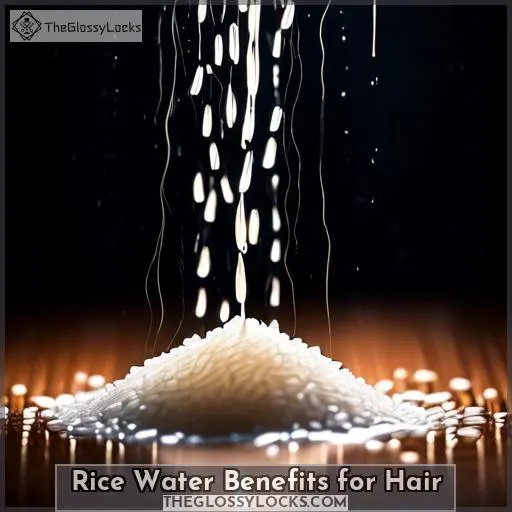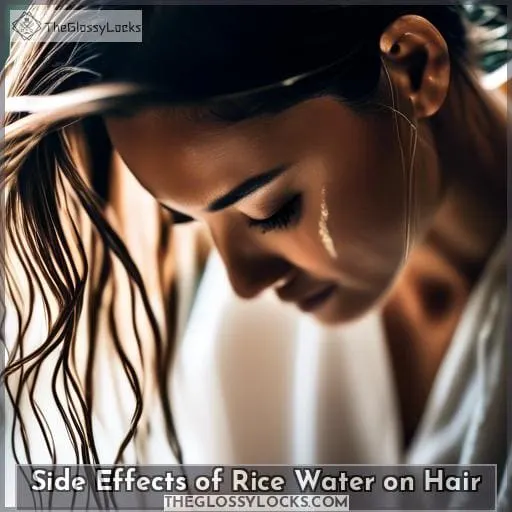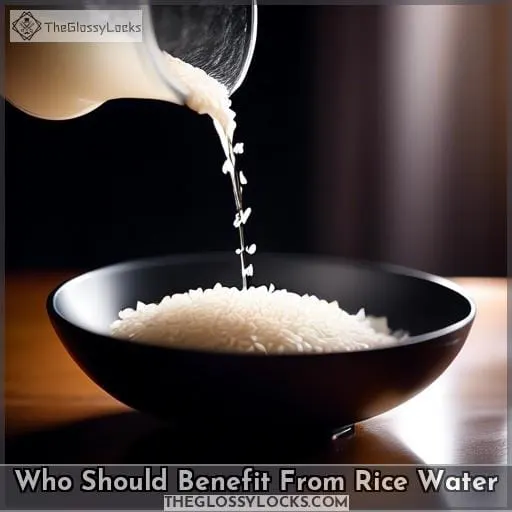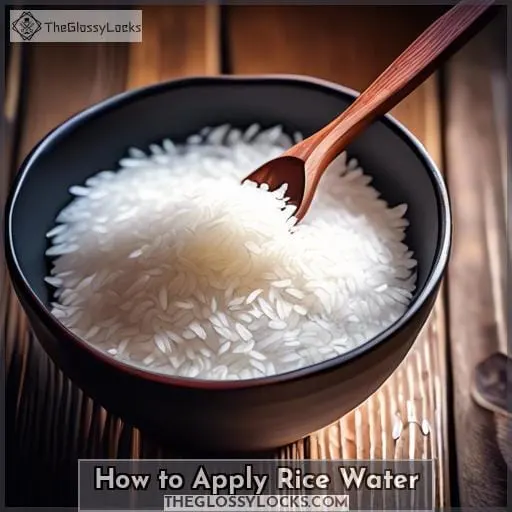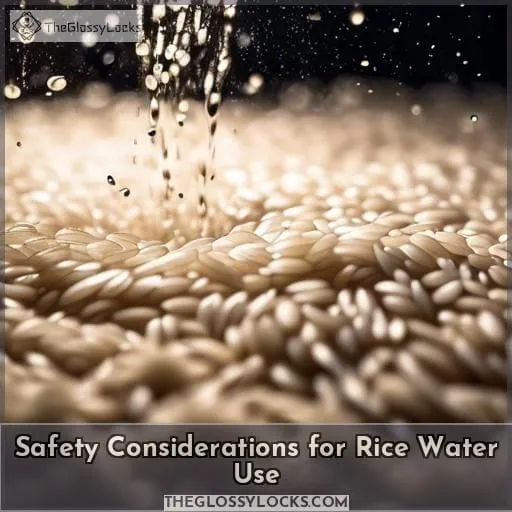This site is supported by our readers. We may earn a commission, at no cost to you, if you purchase through links.
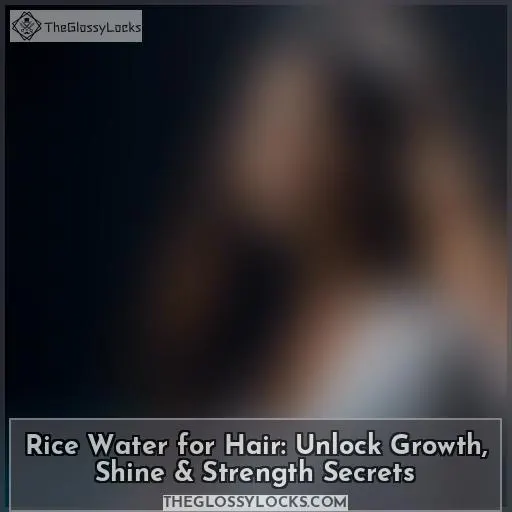
Imagine unlocking the potential for faster-growing, thicker, shinier, and softer hair—all from the comfort of your kitchen.
While the allure of rice water is undeniable, it’s essential to navigate its use with knowledge, understanding both its myriad benefits and potential side effects.
Whether you have color-treated, natural, fine, curly, or damaged hair, rice water might hold the key to elevating your hair care routine.
Dive into the world of rice water for hair: learn how to prepare, apply, and maximize its benefits while considering safety to ensure the best results for your locks.
Table Of Contents
Key Takeaways
- Rice water is believed to strengthen hair roots, enhance shine, and promote faster hair growth.
- It can be prepared by soaking, boiling, or fermenting rice, but should not be used daily due to risks like protein overload and potential arsenic contamination.
- People with color-treated, natural, fine, dull, curly, damaged, or thinning hair may benefit from using rice water.
- While rice water is generally safe, it may cause dry scalp or exacerbate dryness in some individuals, and more research is needed to scientifically prove its benefits for hair.
Rice Water Benefits for Hair
You’re looking to enhance your hair’s health and are curious about the potential benefits of rice water. Rice water is rich in nutrients like amino acids, B vitamins, vitamin E, minerals, and antioxidants, which are believed to strengthen hair roots, aid in hair regeneration, and repair damaged hair.
It’s also been used historically in Asian cultures and has gained popularity through social media and anecdotal reports.
However, it’s important to note that while rice water is considered a natural remedy and is generally safe to use, it’s not a miracle cure. The benefits, such as promoting hair growth, increasing elasticity, and adding volume, remain largely unproven by scientific research.
Some studies and visual evidence suggest it may reduce surface friction and increase hair elasticity, but more research is needed to validate these claims.
For those with eczema, atopic dermatitis, or experiencing hair loss, caution is advised when using rice water. Like any natural product, it can cause skin problems, and excessive use may lead to issues like protein overload, dry scalp, or flakiness.
When using rice water, it’s recommended to wash your hair with shampoo, rinse with rice water, massage into the hair and scalp, leave on for up to 20 minutes, and then rinse thoroughly with warm water.
In conclusion, rice water is a low-risk home remedy that may offer some benefits for hair health, but its effectiveness isn’t conclusively supported by scientific evidence. If you decide to try it, monitor your hair’s response and consult a healthcare provider if you have any underlying skin conditions or significant hair loss.
Faster Growing Hair
Rice water has been touted for its potential benefits for hair health, including promoting faster hair growth. This natural remedy is rich in nutrients like Vitamin E, which nourishes the scalp, and amino acids that are essential for hair growth.
Inositol, found in rice water, is known for strengthening hair, while antioxidants help protect hair from damage. These components work together to potentially make your hair grow faster by providing it with the nourishment it needs to thrive.
However, it’s important to remember that while rice water can be a helpful addition to your hair care routine, it’s not a magic potion. Consistent care and a balanced diet are also key to achieving healthy, long locks.
Thicker and Shinier Hair
Rice water, a traditional beauty treatment, has been making waves as a natural remedy for achieving thicker and shinier hair.
- Promotes Thicker Hair: Rice water is packed with amino acids and vitamins, such as B and E, which nourish the scalp and potentially increase hair volume.
- Enhances Shine: The starch in rice water can coat hair strands, leaving them smooth and shiny.
- Supports Hair Growth: While more research is needed, anecdotal evidence suggests that inositol, a carbohydrate found in rice water, may help strengthen hair roots and promote growth.
Softer Hair
Dive into the world of rice water and watch your damaged hair transform. This ancient secret, rich in inositol, acts like a spa retreat for your strands. Imagine a hair mask that not only brings softer hair but restores vitality, improves elasticity, and reduces breakage.
| Benefit | How Rice Water Helps |
|---|---|
| Softer Hair | Soaks into strands, smoothing and softening |
| Restored Vitality | Inositol repairs, bringing life back |
| Improved Elasticity | Makes hair more flexible, preventing snaps |
| Reduced Breakage | Strengthens from root to tip, less fallout |
Side Effects of Rice Water on Hair
While rice water has been touted for its potential benefits for hair health, it’s important to approach its use with a balanced perspective.
Scalp Sensitivity: If you have a sensitive scalp or conditions like eczema or psoriasis, rice water might exacerbate your issues. The starch content can lead to dryness and irritation.
Protein Overload: Rice water is rich in proteins, which can be beneficial, but too much protein can lead to brittle, weak hair. This is especially true if your hair care routine already includes other protein-based products.
Dryness and Flakiness: Some users report that rice water can dry out the hair and scalp, potentially leading to flakiness. This might be due to the starches in rice water, which can draw moisture out of the hair.
It’s clear that while rice water can be a DIY hair care option, it’s not without its potential drawbacks. If you’re considering using rice water, it’s wise to start with a patch test to see how your scalp and hair react.
And remember, what works for one person may not work for another, so listen to your hair and scalp, and adjust your hair care routine accordingly.
Who Should Benefit From Rice Water
If you’re looking to enhance your hair care routine, rice water might be a beneficial addition, especially if you have color-treated, natural, fine, or dull hair. It’s also recommended for those with curly hair or hair that’s damaged and thinning.
Rice water is rich in amino acids, B vitamins, vitamin E, minerals, and antioxidants, which can contribute to stronger roots, aid in hair regeneration, and repair damaged hair. However, it’s important to note that while rice water can increase shine and promote hair growth, its benefits are largely supported by anecdotal evidence, and more scientific research is needed to fully validate these claims.
Those who should consider using rice water include individuals with:
- Color-Treated Hair: Rice water can help maintain hair strength and shine without stripping color.
- Natural Hair: The nutrients in rice water can nourish and strengthen natural hair textures.
- Fine or Dull Hair: Rice water may add volume and luster to hair that lacks vitality.
- Curly Hair: The smoothing effect of rice water can help manage frizz and define curls.
- Damaged and Thinning Hair: The strengthening properties of rice water can help protect hair from breakage and aid in the repair process.
It’s also important to be aware of potential side effects, such as dryness or protein overload, which can occur with excessive use. Individuals with sensitive scalps or conditions like eczema or psoriasis should use rice water with caution.
When trying rice water, it’s advisable to start with a patch test and use the treatment sparingly to observe how your hair and scalp respond.
Color-Treated Hair
If you have color-treated hair, you’re likely familiar with the struggle to keep it vibrant and healthy. Rice water might be a natural ally in this battle. It’s packed with Vitamin B and E, which can help protect your hair’s color and prevent brassiness.
Additionally, the trace yeast and amino acids in rice water can smooth the cuticle and soften the hair shaft, potentially reducing color fading and promoting root health. However, be mindful of scalp irritation, especially if you have a sensitive scalp.
While rice water is generally safe, it’s always wise to do a patch test first to ensure it doesn’t irritate your skin or exacerbate any scalp conditions.
Natural Hair
If you have natural hair, you might be curious about the rice water trend that’s been making waves in the hair care community.
- Rice water is packed with vitamins B, C, and E, which are essential for hair growth and health.
- It’s a DIY treatment that’s easy to whip up at home—just soak, ferment, or boil rice and strain.
- Using rice water can add shine and strength to your hair, making your natural curls pop.
- It’s a natural remedy that’s been used for centuries, giving it a tried-and-true reputation.
Fine or Dull Hair
If your locks lack luster, fear not! Fermented rice water might be your mane’s new best friend, boosting growth, strength, and shine.
Just remember, a cold rinse post-shampoo can work wonders!
Curly Hair
Curly hair, with its twists and turns, can be a real maze to manage, but here’s a secret shortcut: rice water.
This natural concoction is like a GPS for navigating the tangles, leading to stronger roots and more defined spirals. It’s a moisture-packed path to hair growth, offering a deep conditioning experience that can help detangle and define your curls.
Think of it as a strength training session for your strands, minus the sweat and tears. So, if you’re looking to pump up your curls, rice water might just be the protein shake your hair’s been craving.
Just remember, moderation is key—too much protein can leave your locks feeling more like straw than silk. Whether you’re a curly-haired newbie or a seasoned pro, it’s worth giving rice water a whirl.
Damaged and Thinning Hair
If you have damaged or thinning hair, rice water might be a remedy worth considering. It’s packed with nutrients like vitamins B, C, and E, which can help repair and strengthen your hair. However, it’s important to be aware of potential side effects such as protein overload, which can lead to dryness and breakage, especially if used excessively.
Scalp irritation and flakiness are also possible, particularly for those with sensitive skin or conditions like eczema. Additionally, concerns about arsenic levels in rice have been raised, so it’s crucial to use rice water correctly and in moderation.
For those with damaged and thinning hair, rice water treatments like the Briogeo Don’t Despair, Repair! Rice Water Protein + Moisture Strengthening Hair Treatment, Shu Uemura Izumi Tonic Strengthening & Thickening Rice Water Hair Mask, and Kitsch Rice Water Shampoo Bar for Hair Growth could be beneficial.
These products are inspired by the ancient practices of Japanese court ladies, who used rice water to maintain their famously long hair.
When using rice water, it’s recommended to shampoo your hair first, then apply the rice water, massaging it into the scalp and hair. Leave it on for up to 20 minutes before rinsing thoroughly. While rice water isn’t a guaranteed solution and more research is needed to fully understand its effects, it’s a safe and natural option to try for most hair types.
How to Apply Rice Water
To effectively apply rice water to your hair, start by washing your hair with shampoo as usual. After rinsing out the shampoo, pour the rice water onto your hair, ensuring to saturate both the strands and scalp thoroughly.
Gently massage the liquid into your roots to enhance absorption and stimulate the scalp. It’s crucial not to replace your regular conditioner with rice water; instead, consider using it as a pre-shampoo treatment or in addition to your conditioning routine.
For optimal results, let the rice water sit in your hair for up to 20 minutes before rinsing it out completely with warm water. This process can help unlock the potential benefits of rice water for your hair, such as increased shine, strength, and growth.
Washing Steps
To apply rice water to your hair, start by shampooing as usual. After rinsing out the shampoo, grab your rice water—whether it’s soaked, boiled, or fermented—and pour it over your hair.
Massage it into your scalp and strands, ensuring even coverage. Let this natural elixir work its magic for up to 20 minutes as a leave-in treatment.
Finally, rinse your hair thoroughly with warm water. Customizing treatments like this can be a simple yet effective addition to your hair care regimen, potentially aiding in healing damaged skin and improving overall hair and skin health.
Massage Techniques
After shampooing, it’s time to bring rice water into the mix. Gently pour it over your strands, ensuring it touches every part of your hair and scalp.
Now, here’s where the magic happens: massage the rice water into your roots and all along your tresses. This isn’t just a rinse-and-go; think of it as a mini spa treatment for your scalp. You’re not only promoting scalp hydration and hair follicle stimulation but also fortifying those roots and mending the cuticles.
Picture this as breakage reduction in action. And while you’re at it, remember the best rice water hair products like Mielle Organics Rice Water Moisturizing Milk can further enhance these effects and improve your hair’s moisture barrier.
Keep this up for up to 20 minutes, then rinse off with warm water to reveal what feels like a renewed mane.
Duration of Application
When it comes to the duration of application for rice water on your hair, think of it as a mini spa retreat for your strands. You wouldn’t rush a pampering session, right? So, for a proper scalp massage and leave-in treatment, let the rice water sit for up to 20 minutes.
This isn’t just a quick hello and goodbye—give your hair the time to soak up all those nutrients! Remember, the type of rice water matters too; whether it’s soaked, fermented, or boiled, each has its own charm.
As for frequency of application, once a week is a sweet spot for most hair types. Just like you wouldn’t overindulge in dessert, don’t overdo the rice water to avoid protein overload.
Rice Water Preparation Methods
To prepare rice water for hair care, you have a few options, each with its unique benefits.
You can choose the soaking method, where you rinse and soak rice in water for about 30 minutes to an hour, which is said to be nourishing and quick.
Alternatively, there’s the boiling method, where you cook rice with extra water and use the leftover liquid after straining, which may have excellent antioxidant activity despite concerns about heat destroying some nutrients.
Lastly, the fermented rice water method involves soaking the rice and allowing it to ferment at room temperature for up to two days before straining, which could increase the antioxidant content and potentially offer more benefits for the hair.
Each method is simple and can be done at home, allowing you to experiment and see which works best for your hair care routine.
Soaking Method
After shampooing your hair, the soaking method is a simple way to prepare rice water for a nourishing rinse.
Start by choosing your rice type, then measure out the rice to water ratio—typically 1/2 cup of rice to 2-3 cups of water.
Opt for a clean soaking vessel, and consider the soaking duration, which is usually around 30 minutes. The water temperature should be at room temperature to ensure proper soaking without prematurely fermenting the rice.
Once soaked, strain the rice water into a clean bowl, and it’s ready to use on your hair.
Fermented Vs. Plain Rice Water
When comparing fermented versus plain rice water for hair care, it’s essential to weigh the pros and cons. Fermentation can enhance the antioxidant content, potentially offering greater benefits for hair health.
However, fermented rice water can have a strong, often unpleasant odor that some may find off-putting. In terms of efficacy, while both types of rice water contain nutrients beneficial for hair, the fermentation process might increase the potency of these nutrients.
Regarding shelf life, plain rice water should be used within a few days, especially if not refrigerated, to avoid spoilage. Fermented rice water may last a bit longer but still requires careful storage to prevent mold and bacterial growth.
It’s also important to consider hair type suitability; while most hair types can benefit from rice water, the protein content—particularly in fermented rice water—could potentially lead to protein overload, making strands brittle if used excessively.
In summary, fermented rice water may offer more potent benefits due to increased antioxidants, but it also comes with a stronger smell and a risk of protein overload. Plain rice water is less potent but may be more user-friendly due to its milder scent.
Users should choose based on their personal preferences and hair type, always being mindful of the potential for scalp irritation and the need for proper storage to maintain the product’s integrity.
Boiling Method
Transitioning from the fermentation method, let’s dive into the boiling method for preparing rice water. This cooking method is a quick-fire way to infuse your hair with extra nutrients, without the wait for fermentation.
- Boil your rice to create a concentrated elixir, teeming with hair-loving vitamins.
- No fermentation means no sour scent—just pure, hair-nourishing goodness.
- The boiling method extracts a rich mix of minerals and antioxidants.
- Expect faster effects as the heat ramps up the release of beneficial compounds.
Visual Evidence of Rice Water on Hair
Continuing from the discussion on rice water preparation methods, let’s dive into the visual evidence of rice water on hair. You’ve probably seen the glossy images on social media, where hair transforms from dull to dazzling after a rice water rinse.
Japanese research has visualized the strengthening effect of inositol on hair, a component found in rice water. This suggests that rice water could indeed bolster hair strands. Moreover, a 2010 study indicates that rice water may reduce surface friction and increase hair elasticity, which could translate to less breakage and more bounce in your tresses.
While the rice water benefits for hair growth and elasticity are backed by some studies, it’s important to remember that these benefits aren’t universally proven and more research is needed. However, the anecdotal evidence is strong, with many users reporting smoother, stronger, and more lustrous hair after incorporating rice water into their routine.
So, if you’re curious and your hair is crying out for a little extra love, why not give it a whirl? Just remember, moderation is key—too much of a good thing can lead to protein overload and dryness.
But who knows? Rice water might just be the secret sauce your hair has been craving.
Safety Considerations for Rice Water Use
When considering the use of rice water for hair care, it’s crucial to be aware of potential safety considerations.
Firstly, there’s a risk of protein overload, which can occur because rice water contains a significant amount of protein. While beneficial for many, excessive protein can lead to hair brittleness and breakage for some individuals.
Additionally, those with a dry scalp may find that rice water exacerbates this condition, potentially leading to further discomfort or flakiness.
Another important consideration is the potential for arsenic contamination in rice. Arsenic, a toxic element, can be present in rice and, by extension, rice water. This is particularly concerning with brown rice, which tends to accumulate higher arsenic levels than white rice.
While using rice water as a hair treatment is generally safe for most people, these factors highlight the importance of moderation and awareness of individual hair and scalp needs.
Protein Overload Risk
While rice water is often touted for its potential hair benefits, including strengthening hair roots, aiding in hair regeneration, and providing essential nutrients like vitamins B, C, and E, it’s important to be aware of the potential for protein overload.
This condition can lead to hair damage, hair breakage, scalp irritation, and other negative effects if rice water is used excessively.
Protein sensitivity varies from person to person, and those with low porosity hair may be more susceptible to excessive buildup, which can prevent moisture from penetrating the hair shaft, leading to dryness and brittleness.
It’s crucial to listen to your hair and scalp’s needs and to use rice water in moderation to avoid these side effects.
If you’re considering using rice water, it’s recommended to start with a patch test to ensure you don’t have an adverse reaction, especially if you have a sensitive scalp or conditions like eczema or atopic dermatitis.
Additionally, be mindful of the preparation and storage of rice water to prevent bacterial growth, which can exacerbate scalp issues.
In summary, while rice water can be a beneficial natural hair care treatment for many, it’s not without risks. Pay attention to how your hair responds and adjust usage accordingly to maintain healthy hair and scalp.
Dry Scalp Exacerbation
Continuing from the discussion on protein overload, let’s dive into the issue of Dry Scalp Exacerbation.
If you’re already walking on eggshells with a dry, itchy scalp, pouring rice water over your head might just crack the shell. This starchy concoction can be an irritant, especially if you’re prone to allergic reactions or have a sensitive scalp.
Think of it as a double-edged sword: on one side, it could potentially strengthen your locks, but on the other, it might just leave your scalp feeling like a parched desert.
So, if you’re noticing more snowflakes on your shoulders than outside in winter, it might be time to reconsider your rinse routine. Remember, even Mother Nature’s gifts can sometimes turn against us, and rice water is no exception.
**Arsenic Contamination Concern
Continuing from the concerns about a dry scalp, let’s dive into the issue of arsenic contamination in rice water.
You mightn’t think your hair care routine could involve a chemistry lesson, but here’s a quick heads-up: rice can absorb arsenic from soil and water, which means your DIY rice water rinse might pack more than just nutrients.
While arsenic is more of a gatecrasher than a welcome guest, the good news is that the levels found in homemade rice water are generally considered safe for use on hair and skin. However, it’s smart to play it safe and maybe give your rice a good rinse before brewing your next hair potion.
Testing for quality and safety is always a good practice, especially when it comes to something you’re putting on your body.
Frequently Asked Questions (FAQs)
Can rice water affect hair dye color?
Rice water might not change your hair dye color, but it’s packed with vitamin B which could potentially darken hair by promoting melanin.
So, if you’re rocking a vibrant dye job, proceed with a dash of caution!
How does rice water interact with scalp oils?
Rice water, a kitchen staple turned hair care sensation, plays nice with your scalp oils, acting like a bridge between tradition and modern beauty hacks.
It’s not about reinventing the wheel but understanding how this age-old remedy can complement your hair’s natural oils. Rich in nutrients, rice water helps to nourish and fortify your hair, potentially improving its overall health and appearance.
However, it’s wise to listen to your scalp’s tales; if it’s singing the blues with irritation or dryness, rice water mightn’t be your hair hero. In essence, it’s all about finding that sweet spot where tradition meets your unique hair needs, without tipping the scales.
Is rice water suitable for daily use?
Rice water isn’t a daily hair elixir; it’s a potent potion best used sparingly. Overuse can lead to protein overload, making your locks feel like straw.
Stick to a once-a-week ritual to keep your tresses in tip-top shape!
Can rice water change hair texture?
Ironically, despite the buzz around rice water being a miraculous hair potion, it won’t magically transform your hair texture.
However, it can improve hair’s appearance by adding shine and reducing frizz.
Does rice water influence hair porosity?
Rice water can indeed influence hair porosity, acting as a boon for both high and low porosity hair. For high porosity hair, it’s a knight in shining armor, locking in moisture and strengthening strands.
However, if you’re part of the low porosity squad, tread lightly; it’s a slow dance, not a race. Overdoing it could lead to a protein party nobody’s hair invited, potentially causing dryness and breakage.
So, while it won’t transform your hair’s porosity overnight, using rice water judiciously could lead to stronger, happier locks.
Conclusion
Embarking on the rice water journey is like sowing seeds in a garden; with patience and care, you may cultivate a mane that mirrors the strength and luster of silk.
Rice water for hair isn’t just a trend—it’s a testament to tradition, potentially nurturing your hair from root to tip. Remember, while the promise of enhanced growth, thickness, and softness beckons, it’s crucial to listen to your hair’s needs and proceed with caution to avoid protein overload or dryness.
Embrace this age-old secret and watch as your hair possibly transforms, becoming your crowning glory.

